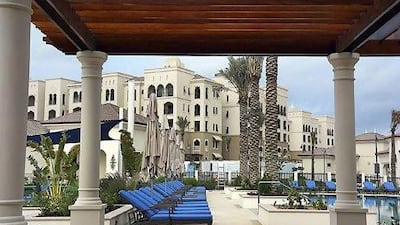The Tourism Development and Investment Company (TDIC), the master developer of Saadiyat Island, has sold 285 apartments to a joint venture between the United States-based property investor Pramerica and the Abu Dhabi state investment fund Mubadala.
In a stock market announcement yesterday the companies announced that the 50/50 Mubadala Pramerica Real Estate Investors (MPREI) joint venture had bought the entire first phase of Saadiyat Beach Residences gated community for an undisclosed sum.
The three five-storey blocks of flats, which were completed last year and are 80 per cent let, will be owned by MPREI. But under the terms of the deal, the property is subject to a five-year leaseback to TDIC, the master developer of major tourism, cultural and residential destinations in Abu Dhabi. TDIC will continue to manage the leasing.
A second phase of 210 flats on the island, which is scheduled to be completed in the third quarter of the year, has not been included in the deal.
The deal represents a key step for MPREI, which was set up in 2010 in an attempt to create investment opportunities for itself and to sell to fund property projects, including affordable residential properties for nurses, engineers, technicians, teachers and other mid-income professionals.
"This transaction demonstrates the quality of the real estate investment opportunities in Abu Dhabi today," said Joe Bonner, the chief investment officer for MPREI. "Saadiyat is becoming a true destination for the region and one which holds the prospect of strong financial returns for our business."
Gaston Urda, of Mubadala and a member of the MPREI board of directors, said: "The real estate market in Abu Dhabi and the broader GCC provides exciting investment opportunities, and through our joint venture we aim to attract long-term investors to the real estate sector."
For TDIC, which last year transferred three of its prime hotel properties to its parent company, the Abu Dhabi Tourism and Culture Authority, in exchange for converting government loans into grants, the extra cash will come as a boost.
TDIC announced a Dh2.1bn loss last year, almost double that of 2011. The company, established in 2006, recorded losses of Dh1.15bn in 2010, Dh551 million in 2009 and Dh368.6m in 2008. More promisingly, revenues rose from Dh333.8m in 2011 to nearly Dh1.3bn last year, and the company ended the year with Dh2.4bn in cash on hand.
The company last year said it was also considering selling packages of land around the proposed New York University campus on Saadiyat to investors.
Ahmed Al Fahim, the executive director of marketing, communications, sales and leasing at TDIC, commented: "This important acquisition by MPREI is a reflection of the high level of interest from global investors in Saadiyat and the local real estate market. We are confident that our exclusive residential communities will continue to attract interest from high-calibre global investors."

